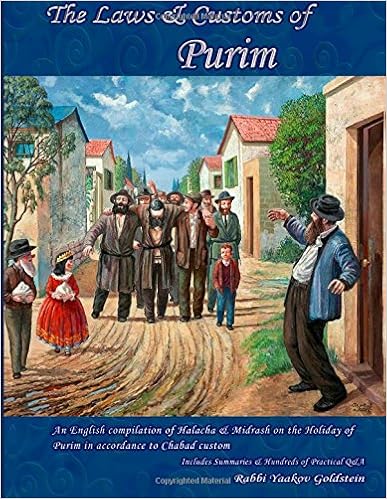This article is an excerpt from our Sefer

Buy me on Amazon.com
One who read the Megillah in the wrong order [Lemafreia]: [1]
One who reads the Megillah in the wrong order does not fulfill his obligation.[2] Thus if one skipped a verse [or even one word[3]] and continued reading, and then read the skipped verse [or word], he has not fulfilled his obligation being that he read it in the wrong order. [This applies even if he already finished reading the entire Megillah and then went back and read the skipped verse.[4] This applies even if one read a later chapter prior to an earlier chapter in which case he does not fulfill his obligation.[5]] In such a case he must go back to the skipped verse and read the rest of the Megillah from that point onwards until the end.
Q&A
What is the law if after the blessing the reader began reading from the wrong verse?
Some Poskim[6] rule that if the reader did not begin reading the first verse after the blessing, and rather read a later verse, then the blessing must be repeated.[7] Others[8] however negate this opinion and rule the blessing is not to be repeated.
Sparks of Chassidus
The Baal Shem Tov taught the following Chassidic teaching on the above law:[9] One who reads the Megillah “Lemafreia” retroactively does not fulfill his obligation. This means to say that one who reads the Megillah and thinks that it is a story of a past event without any future implications, does not fulfill his obligation. The message of the Megillah is eternal for all generations, and is hence to be taken as current events that effect one’s daily service of G-d.
[1] 690/6
[2] The reason: As one is required to read the story of the miracle in the correct sequence. This is learned from a verse “Nizkarim Venaasim” that just like the celebration [Asiya] cannot be done in the wrong order, as one cannot make the date of the 15th appear before the 14th, similarly the reading must be done in the correct order.[Levush brought in Kaf Hachaim 690/35 based on Megillah 17a]
[3] Shulchan Gavoa 690/14; Peri Megadim 690 M”Z 5; M”B 690/22; Kaf Hachaim 690/41
[4] Taz 690/5 in name of Tur; M”B 690/22; Kaf Hachaim 690/41
[5] M”B 690/21; Ritva; Olas Shabbos 690/4; Kaf Hachaim 690/39
The novelty of this ruling is that regarding Shema [64/1] and Hallel [See M”B 422/26] we rule that if one read the verses in the wrong order he does not fulfill his obligation, although if he read the paragraphs in the wrong order he does fulfill his obligation. In 64/1 Admur rules that the reason why by Shema it is valid if the paragraphs are said in the wrong order is because in the Torah itself the paragraphs are not in proximity to each other. This would imply that by Hallel and Megillah, in which the paragraphs are proximate to each other, it would be invalid.
[6] Biur Halacha 690 “Hakorei”; See M”B 422/26 regarding Hallel that a blessing is not to be repeated.
[7] The reason: As is the law any time one makes an interval between the blessing and the Mitzvah. [ibid]
[8] Kaf Hachaim 690/40; See Admur 167/9 [regarding Hamotzi]; 432/7 [regarding Bedikas Chameitz]
[9] Sefer Divrei Shalom Parshas Bo; brought in supplements of Keser Shem Tov 100, p. 336; Sefer Hasichos 1987 p. 351; Likkutei Sichos 6 p. 189, 386; 7 p. 332; Sichas Purim 1976


Leave A Comment?
You must be logged in to post a comment.